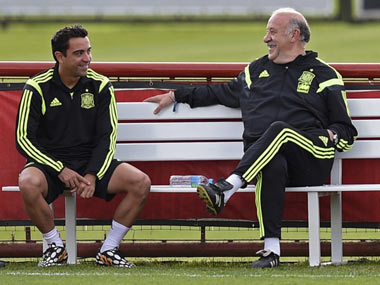Brilliant Spain. Clinical Spain. Greedy Spain. Boring Spain. Boring Spain. Boring Spain. Borriiinnggg… In their prime, Spain were so good that they were boring; boring in the way that Michael Schumacher, Ed Moses or even Martina Navratilova were. The opposition, almost always, was just an afterthought. The first time Spain got their Tiki-Taka act together, it was jaw-dropping. They had Fernando Torres and David Villa upfront but that wasn’t the awe-inspiring act - rather it was the way they moved the ball around the park, the way they kept possession, the way they passively dominated the opposition. It was like watching two teams playing a different version of the same game. [caption id=“attachment_1577865” align=“alignleft” width=“380”]  It was good till it lasted. AFP[/caption] The possession statistics would often indicate the Spain had kept the ball for around 70 percent of the game. In the remaining 30 percent – the opposition needed to get the ball out of defence and find a way to mount an attack. All this with the Spanish players (they followed the ‘get the ball back in five seconds’ rule) hounding you every inch of the way. Xavi Hernandez was Spain’s heart beat, the metronome, pulling the strings, running around and rarely, if ever, missing a pass. Iniesta was the ever-present adventurous sidekick. The rest of the group simply needed to fall in line - Xavi would get the ball to everyone, keep them all involved. They didn’t crush the opposition but that was only perhaps because they never felt the need to. They seemed to be, at times, happy just to pass the ball among themselves – it didn’t matter that there was another team on the field. Whoever said that two teams were needed to play a match hadn’t watched Spain in action. If Spain went up 1-0, the game was as good as over. Brazilian defender Davi Alves, who plays for Barcelona in the La Liga, once said that, “Xavi plays in the future.” And he wasn’t wrong. Xavi had a simple philosophy – think quickly, look for spaces. It kept Spain mobile and made their fluidity breathtakingly beautiful. It took some getting used to and perhaps it got boring only because no team in the world had an answer to Spain’s approach. They watched and hoped for a mistake but for six years Spain didn’t put a foot wrong. Then, they got sucked into the ‘boring’ debate. The team that even changed flanks by stitching together four short passes, suddenly went into the 2014 World Cup hitting long balls and firing in diagonal passes. This wasn’t the Spain we knew; rather this was a Spain that was trying to be different and abandoning it’s identity in the process; an identity that had brought them unbelievable success. The 1-5 loss against Netherlands was a shock. It broke them. But by time the match against Chile ended, the great champions of Spain were little more than cold nostalgia. Xavi, the player who virtually played every minute of their wins at 2008 and 2012 Euro and the 2010 World Cup, started the Chile game on the bench and stayed there for the remainder of the game. The old way had been abandoned, the old players discarded. In a 2011 Guardian interview, Xavi was asked whether Barcelona – the team that played in a manner similar to Spain – put style over success and his answer is enlightening: “If you go two years without winning, everything has to change. But you change names, not identity. The philosophy can’t be lost. Our fans wouldn’t understand a team that sat back and played on the break. Sadly, people only look at teams through success.” Spain decided to change their identity and ended up losing. It was a gamble but for once, one hoped that they would have stuck to their guns; to the style that made them the envy of the world. Tiki-taka was astonishing in a way that direct football will never be and now, we may not see it back on the field for a while. That ship, given Vicente del Bosque’s substitutions, has probably sailed. In the end, though, the exit was soft; the meekness of the hardened veterans was unexpected and Chile were better but still it’ll be hard not to miss Spain. That sadness will stay with us for the 2014 World Cup and beyond.
It took some getting used to and perhaps it got boring only because no team in the world had an answer to Spain’s approach.
Advertisement
End of Article


)

)
)
)
)
)
)
)
)



